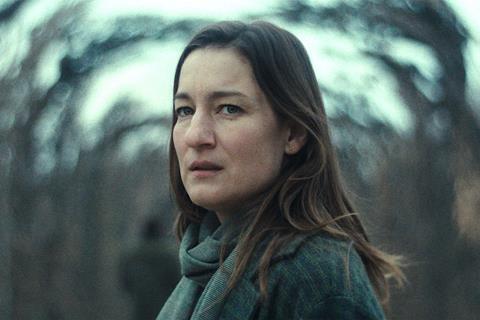Marie Leuenberger gives a terrific performance in a drama that leans into horror

Dir. Johanna Moder. Austria/Switzerland/Germany 2025. 108 mins.
Austrian drama Mother’s Baby is not a genre film, but it is definitely a horror story. A study of postpartum depression, it depicts a woman whose sense of self – and eventually, of reality – is radically affected by the arrival of her first baby. Very much rooted in real-world issues that many viewers will surely recognise, the film feels meticulously calibrated in its emotional complexity and centres on a riveting performance from Marie Leuenberger, affecting and deeply upsetting in turns.
Elegantly shot in a mode of highly atmospheric realism
Following the film’s Berlinale competition debut, it will surely make ripples on the festival circuit and should secure niche distribution (the support casting of international star Claes Bang will no doubt help). But this seems an eminent case of a film that will require content warnings, given its distressing themes.
Directed and co-written by Johanna Moder – following High Performance, Once Were Rebels and TV work including series School of Champions – the film focuses on a 40-year-old woman, Julia Bode (Leuenberger), a highly successful orchestral conductor. She and her husband Georg (Hans Löw) have been trying for a baby, and have consulted Dr Vilfort (Bang), consultant at a private fertility clinic. The film’s opening section takes us at a brisk pace through scenes from the couple’s happy, comfortable life and close, supportive relationship – then, in an extended, tense and boldly executed one-take sequence, shows the delivery of Julia’s baby. Then the mood changes – the baby is removed from the room, and the couple are left wondering what exactly has gone wrong and when they will see their child.
It’s not long, however, before they are reassured: their child is a boy, and while he needed to be temporarily moved to a neonatal ward, soon the family can all go home and start a new life. Still, Julia does not feel secure: watching the child closely, she worries that he isn’t reacting to stimuli, or that he sleeps too much and too deeply. And the rush of maternal contentment and the immediate emotional connection that she has been taught to expect are not happening. She also feels threatened by the attention paid to her child by others, like young midwife Gerlinde (Julia Franz Richter, also starring in fellow Berlin maternal thriller Welcome Home Baby). And increasingly, she begins to suspect that she has been lied to.
Central to our understanding of Julia is the fact that she is a woman of great intellectual and professional expertise accustomed to performing under intense pressure, and someone with understanding of the complexity of emotional states. Apart from putting her new vulnerability in a very particular context, this makes it all the more traumatic when she feels that she has lost control of both her career and her fundamental self. She also becomes acutely aware of being spoken about as if she were not present, when Georg and Dr Vilfort talk about her in the third person.
The casting of Danish star Bang, who rose to fame with The Square, is astute; his charismatic Vilfort initially comes across as embodying a reassuring professional gravitas, but increasingly we see signs of a patronising, authoritarian attitude towards patients. As Julia becomes increasingly suspicious of Vilfort, elements of horror and thriller creep in gradually, until they are amplified to the extreme in the film’s final act. This is where audiences may feel that the film goes too far, not least in introducing a new register of stylisation – but Moder plays ambivalence expertly here, leaving us uncertain of what we are seeing, and of the degree to which Julia’s depression has become full-blown psychosis.
Julia shifts modes from scene to scene, and Leuenberger’s extraordinary performance is modulated with arresting expertise, matching the dynamics of a film that maintains a register of subtle restraint until the closing crescendo – musical analogies being inevitable. And a moody, quietly ominous score by Diego Ramos Rodriguez is cleverly integrated with Julia’s own repertoire of Schubert, Beethoven and Mozart. Elegantly shot by Robert Oberrainer in a mode of highly atmospheric realism, this is a film altogether orchestrated with skill,and a very troubling one.
Production company: FreibeuterFilm
International sales: The Match Factory, sales@matchfactory.de
Producers: Sabine Moser, Oliver Neumann
Screenplay: Johanna Moder, Arne Kohlweyer
Cinematography: Robert Oberrainer
Production design: Hannes Salat
Editing: Karin Hammer
Music: Diego Ramos Rodriguez
Main cast: Marie Leuenberger, Hans Löw, Claes Bang, Julia Franz Richter







![The Brightest SunScreen[Courtesy HKIFF]](https://d1nslcd7m2225b.cloudfront.net/Pictures/274x183/3/5/0/1448350_thebrightestsunscreencourtesyhkiff_312678.jpg)














![The Brightest SunScreen[Courtesy HKIFF]](https://d1nslcd7m2225b.cloudfront.net/Pictures/100x67/3/5/0/1448350_thebrightestsunscreencourtesyhkiff_312678.jpg)











